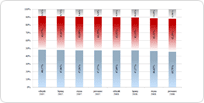Hakom - Croatian Post and Electronic Communications Agency
e-Agency
Users:
Cost Estimator
The Holder of Framework Programme
GIS portal
Privacy calculator
Application ''Quiz''
Market survey
HAKOM: Positive Trends in Revenue Growth in the Postal services market
PRESS RELEASEAs a result of increased activities in the postal services market in the last quarter of 2017, the number of total services and revenue increased in reference to the previous quarter.
ZAGREB, March 2, 2018 - In the fourth quarter of 2017, in the market of postal services in the Republic of Croatia, the growth was expected in almost all segments of the market due to the market trends from several years before. As usually the last quarter of the year records the increased number of postal services (eight percent) compared to the quarter before whereby the growth of letter mails, parcels and prints is recorded but only parcel delivery services keep a steady growth from quarter to quarter. The achievement in large number of services has had a positive effect on the growth of revenue generated by postal services, which has been increased by about six percent in the fourth quarter compared to the quarter before , i.e. by about three percent compared with the same period last year. Although the usage of specific services, such as letters, have been in decline the annual revenue growth has been recorded despite the fact that the total number of services in 2017 is lower than in 2016, primarily due to increased services with some of the added values, or expressive services that grew by 15% in 2017.
Intensified operations in the fourth quarter did not bypass international postal traffic where the largest number of services was accomplished compared to the results achieved over the last three quarters. Thus, the number of services in the fourth quarter was higher by over 26 percent compared to the previous quarter or 17 percent compared to the same period of the previous year and the largest impact on the increase was the number of cross-border parcels, i.e. e-commerce services. This had an impact on the growth of international traffic share on the entire postal market therefore the international traffic had a share of ten percent at the end of fourth quarter.
Further economic growth in the Republic of Croatia for 2018 offers optimism in the postal services market where further positive development is expected. At the end of 2017, there were 22 providers in the postal service market in the Republic of Croatia. The largest was HP-Hrvatska d.d. with a market share of 83 percent.
Intensified operations in the fourth quarter did not bypass international postal traffic where the largest number of services was accomplished compared to the results achieved over the last three quarters. Thus, the number of services in the fourth quarter was higher by over 26 percent compared to the previous quarter or 17 percent compared to the same period of the previous year and the largest impact on the increase was the number of cross-border parcels, i.e. e-commerce services. This had an impact on the growth of international traffic share on the entire postal market therefore the international traffic had a share of ten percent at the end of fourth quarter.
Further economic growth in the Republic of Croatia for 2018 offers optimism in the postal services market where further positive development is expected. At the end of 2017, there were 22 providers in the postal service market in the Republic of Croatia. The largest was HP-Hrvatska d.d. with a market share of 83 percent.
Postal services market data in the fourth quarter are available on the Croatian Network of Regulatory Agency (HAKOM) web site at default.aspx?id=29
# # #
For additional information please contact:
Croatian Regulatory Authority for Network Industries (HAKOM)
Roberta Frangeša Mihanovića 9
10110 Zagreb, Croatia
Tel. + 385 (0) 1 700 70 07
Fax + 385 (0)1 700 70 70
Media inquiries can be submitted online using HAKOM’s official website:
Registration required.
ABOUT HAKOM: HAKOM (www.hakom.hr) - Croatian Regulatory Authority for Network Industries – ensures preconditions for a fair market competition, stable growth and environment for innovations in the electronic communications and postal services market. HAKOM protects users’ interests and the possibility of choice among various communications and postal services at affordable prices, defines sustainable competitive conditions for operators and service providers under fair conditions for return on investment, and provides support to economic growth, public services and the quality of life in the Republic of Croatia by using modern technologies. HAKOM’ strategic goals are: to promote regulation of the electronic communications and postal services market, to support growth of investments and innovations in the electronic communications and postal services market, to provide efficient use of limited resources, to accelerate the growth of broadband products and services, to provide affordable offers of communications and postal services, to provide protection and informing of users, to build an efficient and comprehensive information system, to define and implement efficient processes, and to acquire multi-disciplinary competencies in market regulation.












